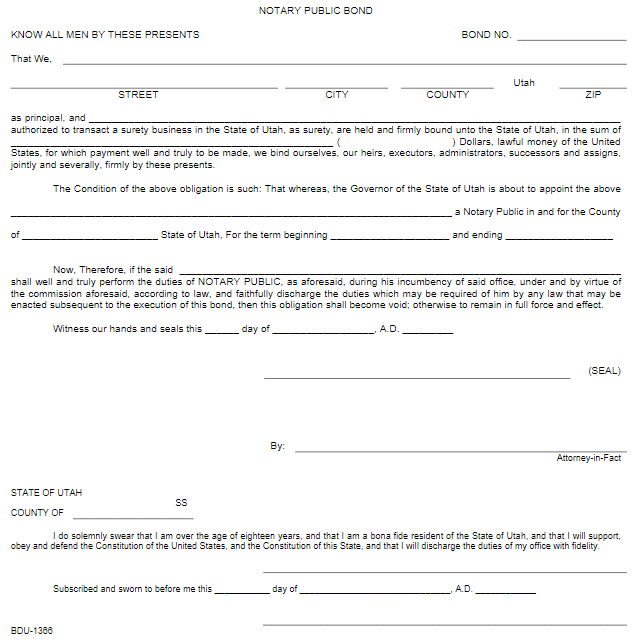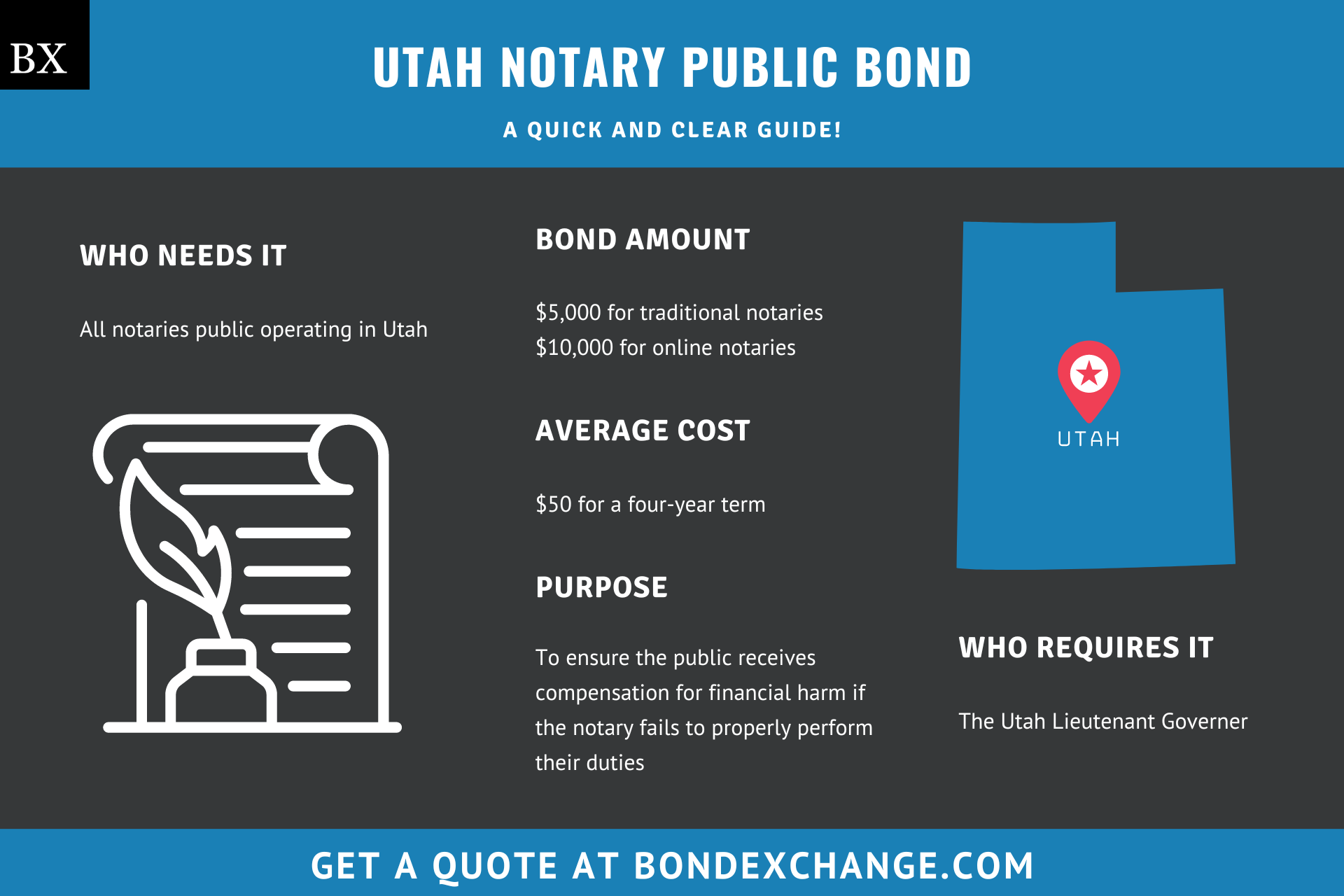Utah Notary Public Bond: A Comprehensive Guide
This guide provides information for insurance agents to help their customers obtain a Utah Notary Public bond.
At a Glance:
- Average Cost: $50 for a four-year term
- Bond Amount: Based on the commission type:
- $5,000 for traditional notaries
- $10,000 for online notaries
- Who Needs it: All notaries public operating in Utah
- Purpose: To ensure the public receives compensation for financial harm if the notary fails to properly perform their duties
- Who Regulates Notaries Public in Utah: The Utah Lieutenant Governor

Background
Utah Code 46-1-3 requires all notaries operating in the state to obtain a commission, also known as a Certificate of Authority, from the Lieutenant Governor before providing notarial services. The Utah legislature enacted this requirement to ensure that notaries engage in ethical business practices. To provide financial security for the enforcement of the commission requirement, notaries must purchase and maintain a $5,000 or $10,000 surety bond to be eligible for a commission.
What is the Purpose of the Utah Notary Public Bond?
Utah requires notaries to purchase a surety bond as a prerequisite to obtaining a notary commission. The bond protects the public from financial harm if the notary fails to comply with the regulations outlined in Utah Code 46-1-4. Specifically, the bond protects the public if the notary signs any documents for persons committing fraud or does not actually witness the signatures on documents being notarized. In short, the bond is a type of insurance that protects the public if the notary violates the terms of their commission.
How Can an Insurance Agent Obtain a Utah Notary Public Surety Bond?
BondExchange makes obtaining a Utah Notary Public bond easy. Simply log in to your account and use our keyword search to find the “Notary” bond in our database. Don’t have a login? Gain access now and let us help you satisfy your customers’ needs. Our friendly underwriting staff is available by phone at (800) 438-1162, email, or chat from 7:30 AM to 7:00 PM EST to assist you.
At BondExchange, our 40 years of experience, leading technology, and access to markets ensures that we have the knowledge and resources to provide your clients with fast and friendly service whether obtaining quotes or issuing bonds.
Not an agent? Then let us pair you with one!
Click the above image to find a BX Agent near you
How is the Bond Amount Determined?
Utah requires traditional notaries public to purchase and maintain a $5,000 surety bond, and remote notaries to purchase and maintain a $10,000 surety bond. Notaries must obtain their traditional commission before applying for a remote online one. As such, remote online notaries simply need to increase their existing bond amount to be eligible for appointment.
Is a Credit Check Required for the Utah Notary Public Bond?
No, a credit check is not required for the Utah Notary Public bond. Because the bond is considered relatively low risk, the same low rate is offered to all notaries in the state regardless of their credit history.
How Much Does the Utah Notary Public Bond Cost?
The Utah Notary Public bond costs just $50 for a four-year term.
Who is Required to Purchase the Utah Notary Bond?
Utah requires notaries to purchase a $5,000 surety bond as a prerequisite to obtaining a traditional notary commission. To paraphrase Utah Code 46-1-6, a notary public is a public official authorized to provide the following services:
- Take acknowledgments and jurats
- Administer oaths and affirmations
- Certify or attest a copy
- Serve as an impartial witness to the signing of documents
Utah Code 46-1-4 requires notaries seeking to provide remote notarial services to obtain an additional $5,000 of bond coverage. A remote online notary is a commissioned notary public approved by the Lieutenant Governor to use communication technology to perform a notarial act when the signer is not in the same physical location as the notary public.

How Do Notaries Apply for a Commission in Utah?
Notaries public in Utah must navigate several steps to obtain a commission, also known as a Certificate of Authority. Below are the general guidelines, but applicants should refer to the Lieutenant Governor’s website or the Utah Notary Public Handbook for details on the process.
Commission Term: All Utah Notary Public Commissions are valid for four years from the date of issuance.
Notaries Public
Step 1 – Meet the Qualifications
To be eligible to apply for a notary public commission, applicants must meet all of the following criteria:
-
- Be at least 18 years old
- Be able to read, write, and understand English
- Be a citizen or permanent resident of the United States
- One of the following:
- Legally reside in Utah
- Be employed in Utah at least 30 days prior to applying
Step 2 – Create a Utah.gov Account
Notaries must first create an account with Utah.gov in order to take the examination or submit an application. Once the account is created, the notary will be directed to the testing page to begin the exam.
Step 3 – Take the Exam
Notaries must successfully pass an exam on notary laws and procedures prior to submitting an application for commission. To prepare for the exam, notaries should refer to the state’s notary public study guide. There are 35 multiple-choice questions on the exam, and notaries must pay a $95 testing fee. If the notary fails, they have the option to re-take the test within 30 days for a fee of $40 per attempt.
Step 4 – Complete a Background Check
Notaries are required to submit a mandatory background check in order to qualify for a notary public commission. After passing the exam, notaries will be directed to the background check page where they can submit all required information. Applicants will not be notified of the results of the background check and should continue through the application process without them.
Step 5 – Purchase a Surety Bond
Notaries public are required to purchase and maintain a $5,000 surety bond. Notaries will also complete their oath of office at this time, and the oath must be notarized by an existing commissioned notary.
Step 6 – Submit an Application
Notaries public must submit a completed application to the Lieutenant Governor’s office online via their Utah.gov account. Notaries must complete the application in its entirety and upload the original surety bond form along with the notarized oath of office with it. Commissions will be emailed to notaries after the required documents are submitted and processed by the Office of the Lieutenant Governor within 1-2 weeks.
Remote Notaries
Step 7 – Select a Technology Vendor
Only an active notary public with a current commission is able to register as a remote notary. A commissioned notary can register to become a remote notary by first selecting a technology vendor. The vendor will provide the software that the notary will use in remote notarizations, and notaries can select from the approved vendors list provided by the state.
Step 8 – Increase Bond Coverage
Notaries public are required to either purchase and maintain an additional $5,000 surety bond or increase the limit on their existing one.
Step 9 – Submit an Application
Notaries must submit the following items to the Lieutenant Governor’s office via email:
-
- Completed application form
- Additional surety bond
- Copy of their electronic signature/seal
- $50 application fee
The selected technology vendor will provide the notary with both the application form and the electronic seal/signature. Notaries should call the Lieutenant Governor’s office and pay the application fee over the phone with a credit card. Once approved, the notary will receive an email confirmation that they are now an active remote notary.
How Do Utah Notaries Public Renew Their Commissions?
Utah does not have a specific renewal process for notaries public, however, you may use your current Utah.gov login to update your information and reapply for commission. All Utah Notary Public Commissions are valid for four years from the date of issuance. Remote notary registrations run concurrently with existing notary public commissions and a renewal of a traditional notary commission will also renew a remote notary registration.
What are the Insurance Requirements for Notaries Public in Utah?
Utah does not require notaries to purchase any form of liability insurance as a prerequisite to obtaining a commission. Notaries public must purchase and maintain a $5,000 surety bond, and remote notaries must purchase and maintain an additional $5,000 surety bond.
How Do Utah Notaries File Their Bonds?
Notaries public should file their completed bond forms, including the power of attorney, with the Lieutenant Governor’s office when submitting their applications online.
The bond requires signatures from both the surety company that issues the bond and the notary. The surety company should include the following information on the bond form:
- Legal name, address, and county of the entity/individual(s) buying the bond
- Surety company’s name
- Bond amount
- Date the bond is signed
- Start and end dates of notary’s commission
What Can Utah Notaries Do to Avoid Claims Against Their Bonds?
To avoid claims on their bonds, notaries public in Utah must adhere to all state regulations, including some of the most important issues below that tend to cause claims:
- Do not leave any notary supplies (seal and journal) in a place where they can be easily stolen
- Do not perform notary services for entities/individuals who are engaged in acts of fraud
- Ensure that the signers of documents are who they say they are and are not misrepresenting themselves
- Witness the signatures of all documents being notarized
- Record all transactions in a notary journal
What Other Insurance Products Can Agents Offer Notaries in Utah?
BondExchange offers free notary E&O insurance with the surety bond purchase for notaries in Utah. Unlike a surety bond, E&O insurance protects the notary rather than the public.
How Can Insurance Agents Prospect for Utah Notary Customers?
Utah conveniently provides a public database of commissioned notaries operating in the state. Contact BondExchange for additional marketing resources. Agents can also leverage our print-mail relationships for discounted mailing services.
What Other States Require Notary Bonds?
29 states and the District of Columbia require notaries to purchase a surety bond as a prerequisite to obtaining a commission. Insurance agents should utilize our Main Notary Bond Page for a detailed analysis of the Notary Bond requirements nationwide.

